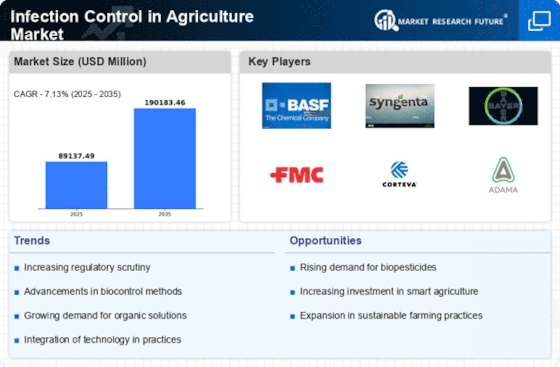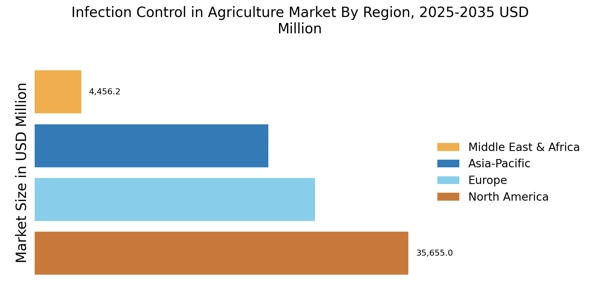Rising Incidence of Plant Diseases
The Infection Control in Agriculture Market is increasingly responding to the rising incidence of plant diseases, which poses a significant threat to crop yields and food security. Factors such as climate change and monoculture practices are exacerbating the spread of pathogens, necessitating effective infection control measures. Recent studies indicate that crop losses due to diseases can reach up to 30% in some regions, prompting farmers to seek innovative solutions. The demand for effective disease management strategies is expected to drive market growth, with a projected increase of 12% in the adoption of infection control products and services over the next few years. This trend underscores the critical need for robust infection control mechanisms in agriculture.
Regulatory Pressures and Compliance
The Infection Control in Agriculture Market is significantly influenced by stringent regulatory frameworks aimed at ensuring food safety and public health. Governments are implementing rigorous standards for pesticide use and pathogen control, compelling agricultural producers to adopt advanced infection control measures. Compliance with these regulations often necessitates investment in new technologies and practices, which can be costly but ultimately beneficial. The market for infection control solutions is expected to expand as farmers seek to meet these regulatory requirements, with an estimated growth rate of 10% anticipated in the next few years. This regulatory landscape is likely to drive innovation and adoption of safer, more effective infection control methods.
Technological Advancements in Agriculture
The Infection Control in Agriculture Market is experiencing a technological renaissance, with innovations such as precision agriculture and smart farming techniques gaining traction. These advancements enable farmers to monitor crop health and pathogen presence in real-time, facilitating timely interventions. The integration of drones, IoT devices, and data analytics is transforming traditional farming practices, allowing for more efficient infection control strategies. Market analysts project that the adoption of these technologies could lead to a 20% reduction in crop losses due to infections, thereby enhancing productivity and profitability for farmers. This technological evolution is reshaping the landscape of infection control in agriculture.
Increasing Demand for Sustainable Practices
The Infection Control in Agriculture Market is witnessing a marked shift towards sustainable agricultural practices. This trend is driven by heightened consumer awareness regarding food safety and environmental impact. Farmers are increasingly adopting integrated pest management (IPM) strategies that emphasize the use of biocontrol agents and organic solutions. According to recent data, the market for biopesticides is projected to grow at a compound annual growth rate (CAGR) of approximately 15% over the next five years. This shift not only addresses the need for effective infection control but also aligns with global sustainability goals, thereby enhancing the overall resilience of agricultural systems.
Consumer Preferences for Safe and Healthy Produce
The Infection Control in Agriculture Market is significantly shaped by evolving consumer preferences for safe and healthy produce. As consumers become more health-conscious, there is a growing demand for food products that are free from harmful pathogens and chemical residues. This shift is prompting farmers to adopt more rigorous infection control practices, including the use of organic and environmentally friendly solutions. Market Research Future indicates that the organic food sector is expected to grow at a CAGR of 10% in the coming years, reflecting the increasing consumer inclination towards safer food options. This trend is likely to drive innovation in infection control methods, as producers strive to meet the expectations of health-conscious consumers.

















